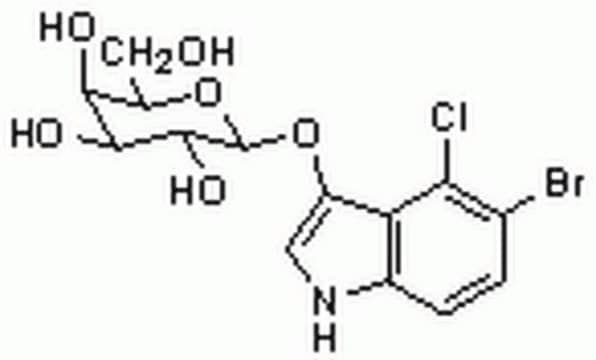B6024
5-Bromo-4-chloro-3-indolyl β-D-galactopyranoside
tablet, suitable for identification of lac+ bacterial colonies
Synonym(s):
5-Bromo-4-chloro-3-indolyl β-D-galactoside, BCIG, X-Gal
About This Item
Recommended Products
product name
5-Bromo-4-chloro-3-indolyl β-D-galactopyranoside, tablet
form
tablet
Quality Level
suitability
suitable for identification of lac+ bacterial colonies
storage temp.
−20°C
SMILES string
OC[C@H]1O[C@@H](Oc2c[nH]c3ccc(Br)c(Cl)c23)[C@H](O)[C@@H](O)[C@H]1O
InChI
1S/C14H15BrClNO6/c15-5-1-2-6-9(10(5)16)7(3-17-6)22-14-13(21)12(20)11(19)8(4-18)23-14/h1-3,8,11-14,17-21H,4H2/t8-,11+,12+,13-,14-/m1/s1
InChI key
OPIFSICVWOWJMJ-AEOCFKNESA-N
Looking for similar products? Visit Product Comparison Guide
Related Categories
General description
Application
Biochem/physiol Actions
Quantity
Reconstitution
related product
Storage Class Code
11 - Combustible Solids
WGK
WGK 3
Flash Point(F)
Not applicable
Flash Point(C)
Not applicable
Personal Protective Equipment
Certificates of Analysis (COA)
Search for Certificates of Analysis (COA) by entering the products Lot/Batch Number. Lot and Batch Numbers can be found on a product’s label following the words ‘Lot’ or ‘Batch’.
Need A Sample COA?
This is a sample Certificate of Analysis (COA) and may not represent a recently manufactured lot of this specific product.
Already Own This Product?
Find documentation for the products that you have recently purchased in the Document Library.
Customers Also Viewed
Our team of scientists has experience in all areas of research including Life Science, Material Science, Chemical Synthesis, Chromatography, Analytical and many others.
Contact Technical Service





